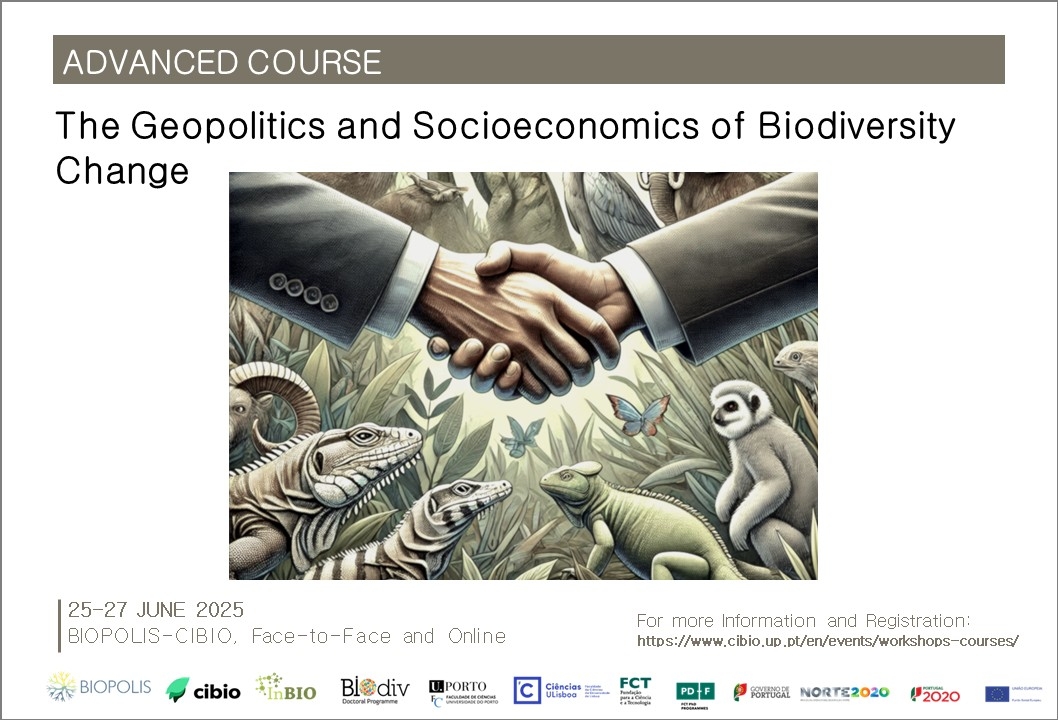The Geopolitics and Socioeconomics of Biodiversity Change
From 25 Jun 2025 until 27 Jun 2025 - BIOPOLIS-CIBIO, Vairão, Portugal (Face-to-face and Online)

This course explores the intricate interplay between geopolitical dynamics, socioeconomic factors, and biodiversity change on a global scale. Participants will delve into the complex relationships between human activities, environmental degradation, and the loss of biodiversity, examining how these factors shape and are shaped by geopolitical tensions, economic systems, and societal structures. Through case studies, discussions, and interactive sessions, participants will gain a deep understanding of the geopolitical and socioeconomic dimensions of biodiversity change, specificly to:
- Understand the Interconnectedness of Biodiversity Change and Global Dynamics: Explore the multifaceted relationships between biodiversity loss, geopolitical shifts, and socioeconomic factors on a global scale.
- Analyze Geopolitical Drivers of Biodiversity Change: Examine how geopolitical factors such as international trade, conflict, and governance structures influence patterns of biodiversity loss and conservation efforts.
- Evaluate Socioeconomic Impacts of Biodiversity Change: Investigate the socioeconomic consequences of biodiversity loss, including effects on human health, livelihoods, and cultural heritage.
- Examine Case Studies and Regional Perspectives: Analyze case studies from different regions to understand the diverse geopolitical and socioeconomic contexts of biodiversity change.
- Explore Policy Responses and Conservation Strategies: Discuss policy frameworks, international agreements, and conservation strategies aimed at mitigating biodiversity loss and promoting sustainable development.
- Engage in Interdisciplinary Discussions: Foster interdisciplinary dialogue among participants from diverse backgrounds to explore holistic approaches to addressing biodiversity change.
- Identify Opportunities for Collaboration and Action: Identify opportunities for collaborative action and innovative solutions at the intersection of geopolitics, socioeconomic development, and biodiversity conservation.
- Promote a Systems Thinking Approach: Encourage participants to adopt a systems thinking approach to understand the complex interactions between human societies and natural ecosystems and to develop holistic solutions to biodiversity challenges.
This course aims to equip participants with the knowledge, analytical tools, and collaborative skills needed to address the complex geopolitical and socioeconomic dimensions of biodiversity change and contribute to global efforts towards biodiversity conservation and sustainable development.
PROGRAM
Day 1: Introduction to key concepts
Morning Session:
- Introduction to the course objectives and structure
- Overview of the concepts of biodiversity, geopolitics and socioeconomy
- Discussion on the interconnectedness of biodiversity change with global dynamics
Afternoon Session:
- Case studies highlighting examples of how geopolitical shifts and socioeconomic factors influence biodiversity change
- Interactive discussions on the implications of biodiversity loss for global stability and sustainable development
Day 2: Analyzing Geopolitical Drivers of Biodiversity Change
Morning Session:
- The geopolitical drivers of biodiversity change, including international trade, resource competition, and geopolitical conflicts
- Examination of governance structures and policies affecting biodiversity conservation efforts
Afternoon Session:
- Case studies exploring how geopolitical factors shape biodiversity conservation strategies and initiatives at regional and international levels
- Group exercises to analyze the geopolitical dimensions of specific biodiversity hotspots
Day 3: Evaluating Socioeconomic Impacts of Biodiversity Change
Morning Session:
- Exploration of the socioeconomic consequences of biodiversity loss, including impacts on human health, livelihoods, and cultural heritage
- Discussion on the role of socioeconomic factors such as urbanization, population growth, and economic development in driving biodiversity change
Afternoon Session:
- Case studies illustrating the complex interactions between socioeconomic dynamics and biodiversity conservation efforts
- Interactive sessions on assessing the social and economic costs of biodiversity loss and the benefits of conservation
CALENDAR
3 days - 21h (Friday all day) - Schedule: 09:30 - 13:00 & 14:00 - 17:30
COURSE INSTRUCTORS
Coordination
Joana Ribeiro | BIOPOLIS-CIBIO/ISA
Instructor (s)
Joana Ribeiro | BIOPOLIS-CIBIO/ISA
Joana Ribeiro | BIOPOLIS-CIBIO/ISA
Luís Reino | BIOPOLIS-CIBIO
SELECTION CRITERIA
The course will be open to a maximum number of 10 participants.
75% of available student slots are reserved for BIODIV students.
Priority will be given to:
• 1st year and other PhD students attending the BIODIV Doctoral Program;
• PhD students attending other courses;
• Other post-graduate students and researchers.
(A minimum number of participants is required for the course to take place)
APPLICATION
Deadline: 12 May 2025
To apply fill the FORM
A copy of the form will be sent to the email address you provide as proof that you have successfully submitted your application. Results will be emailed to you within 8 working days of the application deadline.
REGISTRATION
65€ (students) | 100€ (other participants).
BIOPOLIS/ CIBIO members will have an additional discount of 20%. Participation is free of charge for BIODIV Students (M BGE & PhD) & CIBIO's TwinLabs
(If applicable, payment will be made to Associação BIOPOLIS - VAT No. 516033727. Information on the payment amount and the payment deadline will be sent together with the results notification, and a proforma invoice may be issued in due time).
MORE INFORMATION
Registration fees do not include accommodation or meals.
No ECTS credits are awarded for attending the course. Participants receive a certificate of attendance without quantitative evaluation.